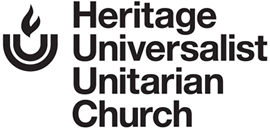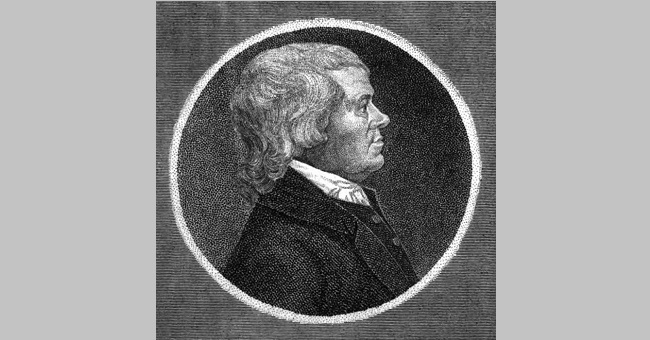by Mike Roberts, Church Historian
We left our hero, John Murray, the founding father of our Universalist faith, aboard a ship bound for the American colonies. He had suffered the loss of his wife, child, four siblings and his father to death. He had been scorned, ridiculed and threatened for his belief in universal salvation. Heading for a new life in America offered hope for a brighter future.
A series of fortunate minor mishaps caused Murray’s ship to make an emergency land fall in New Jersey. Murray was sent out on a small boat to look for help. When he landed on the shore, he tied up the boat and looked for assistance. Eventually, he came upon John Potter, an eccentric New Jersey farmer who took Murray in with welcome arms. Potter lived in his own farm house but also had built a small church on the property, hoping to begin a local congregation. On finding that Murray had done extensive preaching in England, Potter invited him to address a gathering of friends and neighbors at his church. Thus, on September 30, 1770, the first Universalist sermon was delivered in America.
Word spread that a new preacher was in town and invitations to speak at first trickled in then became more plentiful. Initially, Murray spoke in the general vicinity of Potter’s home but then speaking requests began coming from as far away as New York.
While Murray’s original sermon was the first of its kind in America, the concept of universal salvation was not a brand new idea to the colonies. In parlor conversation, across tea rooms and even in pubs, the idea had been discussed and there was interest. James Relly’s book had already found its way to America and was at the root of this talk. Now a preacher lived in their midst who could intelligently explain the concept and this preacher had actually heard Relly speak and conversed with him in England. However, one of the biggest obstacles that Murray had to face was his not being an ordained minister. He had not been sanctioned by any religious body to preach the gospel and he had scant formal training in the message of the Bible. To the solidly based religions of the day who demanded extensive training for their ministers, rabbis and priests, he was a quack. He was likeable and obviously intelligent but they still regarded him as a dangerous influence.
Nonetheless, requests to speak came from up and down the Mid-Atlantic coast. Eventually, over the next few years, Murray made addresses as far north as New Hampshire and as far south as Maryland. At times, friendly ministers would allow him the use of their churches but many times the sermons were delivered in public buildings, as churches were closed to him. Resistance was as mild as a few short rebukes and cold shoulders and as harsh as rocks and eggs being thrown at him as he spoke. However, he often expressed that there was true freedom of religion in the Americas and he felt much more at ease presenting his view of Christian theology in his new home than he ever did in his old homeland.
While Murray’s views were rejected by most religious leaders, he was considered a friend by many. He was likeable, he rarely attacked those who disagreed with him and he was eager to be a source of help for his new homeland. Strife with the mother country was nearing revolution and two honors paid to him are indicative of his acceptance. When George Washington journeyed to Cambridge, Massachusetts on July 3, 1775 to take command of the Continental Army, Murray was part of the delegation selected to greet Washington upon his arrival. Also, the Rhode Island Brigade of the new army asked him to serve as their chaplain, a role which Murray gratefully assumed and of which Washington approved.
It would have been easy for Murray to have started his own church. Everywhere he traveled and spoke, he was offered a pulpit in which to settle. Murray steadfastly clung to the belief that his message could be spread much more effectively and quickly if he remained an itinerant preacher and traveled far and wide to spread the word.
We must leave John Murray until next month. He is actively spreading the story of Universalism but war clouds loom on the horizon. Revolution is near.
Image: Rev. John Murray
Image from Dictionary of Unitarian & Universalist Biography.

